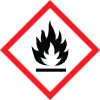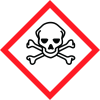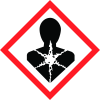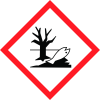2,4-Dinitrophenol
Sigma-Aldrich Inc
Revision date : 2023-04-16




General Information
Version
6.6
Revision date
2023-04-16
Product name
2,4-Dinitrophenol
REACH No
This
Emergency telephone
800-424-9300, +1-703- 527-3887
Icons in SDS
Company Information
Company name
Sigma-Aldrich Inc
GHS Information
Signal word
Danger
Hazard Codes
Hazard statements (CLP)
H208, H300, H311, H311+H331, H331, H372, H400
Hazard statements
Code
Statements
H208
Fire hazard; increased risk of explosion if desensitizing agent is reduced
H300
Fatal if swallowed
H311
Toxic in contact with skin
H311+H331
Toxic in contact with skin or if inhaled.
H331
Toxic if inhaled
H372
Causes damage to organs through prolonged or repeated exposure
H400
Very toxic to aquatic life
Precautionary statements
Code
Statements
P210
Keep away from heat, hot surface, sparks, open flames and other ignition sources. - No smoking.
P212
Avoid heating under confinement or reduction of the desensitized agent.
P230
Keep wetted with ...
P233
Keep container tightly closed.
P280
Wear protective gloves/protective clothing/eye protection/face protection.
P301+P310
IF SWALLOWED: Immediately call a POISON CENTER/doctor/...
P371+P380+P375
In case of major fire and large quantities: Evacuate area. Fight fire remotely due to the risk of explosion.
P501
Dispose of contents/container to ...
Section 2
SECTION 2: Hazards identification
2.1 Classification of the substance or mixture
Classification
2.2 Label elements
Labelling
Signal word
Danger Danger
Hazard statements
H208 Fire hazard; increased risk of explosion if desensitizing agent is reduced. H300 Fatal if swallowed. H311 + H331 Toxic in contact with skin or if inhaled. H372 Causes damage to organs through prolonged or repeated exposure. H400 Very toxic to aquatic life. Reduced Labeling (<= 125 ml) H208 Fire hazard; increased risk of explosion if desensitizing agent is reduced. H300 Fatal if swallowed. H372 Causes damage to organs through prolonged or repeated exposure. H311 + H331 Toxic in contact with skin or if inhaled. 2.3
Precautionary statements
P210 Keep away from heat, hot surfaces, sparks, open flames and other ignition sources. No smoking. P212 Avoid heating under confinement or reduction of the desensitizing agent. P230 Keep wetted with water. P233 Keep container tightly closed. P280 Wear protective gloves/ protective clothing/ eye protection/ face protection. P301 + P310 IF SWALLOWED: Immediately call a POISON CENTER/ doctor. P371 + P380 + P375 In case of major fire and large quantities: Evacuate area. Fight fire remotely due to the risk of explosion. P501 Dispose of contents/ container to an approved waste disposal plant. P210 Keep away from heat, hot surfaces, sparks, open flames and other ignition sources. No smoking. P212 Avoid heating under confinement or reduction of the desensitizing agent. P230 Keep wetted with water. P233 Keep container tightly closed. P280 Wear protective gloves/ protective clothing/ eye protection/ face protection. P301 + P310 IF SWALLOWED: Immediately call a POISON CENTER/ doctor. P371 + P380 + P375 In case of major fire and large quantities: Evacuate area. Fight fire remotely due to the risk of explosion. P501 Dispose of contents/ container to an approved waste disposal plant.
Supplemental label elements
none none
2.3 Other hazards
This substance/mixture contains no components considered to be either persistent, bioaccumulative and toxic (PBT), or very persistent and very bioaccumulative (vPvB) at levels of 0.1% or higher. Desensitized explosive SECTION 3: Composition/information on ingredients

